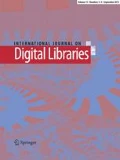Abstract
There is no doubt that the enormous amounts of information on the WWW are influencing how we work, live, learn and think. However, information on the WWW is in general too chaotic, not reliable enough and specific material often too difficult to locate that it cannot be considered a serious digital library. In this paper we concentrate on the question how we can retrieve reliable information from the Web, a task that is fraught with problems, but essential if the WWW is supposed to be used as serious digital library. It turns out that the use of search engines has many dangers. We will point out some of the possible ways how those dangers can be reduced and how dangerous traps can be avoided. Another approach to find useful information on the Web is to use “classical” resources of information like specialized dictionaries, lexica or encyclopaedias in electronic form, such as the Britannica. Although it seemed for a while that such resources might more or less disappear from the Web due to attempts such as Wikipedia, some to the classical encyclopaedias and specialized offerings have picked up steam again and should not be ignored. They do sometimes suffer from what we will call the “wishy-washy” syndrome explained in this paper. It is interesting to note that Wikipedia which is also larger than all other encyclopaedias (at least the English version) is less afflicted by this syndrome, yet has some other serious drawbacks. We discuss how those could be avoided and present a system that is halfway between prototype and production system that does take care of many of the aforementioned problems and hence may be a model for further undertakings in turning (part of) the Web into a useable digital library.





Similar content being viewed by others
References
Andera, M., Stein, B., Lipka, N.: Towards Automatic Quality Assurance in Wikipedia. WWW 2011 Poster (2011)
APA Picture Desk: http://www.picturedesk.com/bild-disp/apa/de/home.html (2011)
Blekko: http://blekko.com. Accessed 23 Nov 2010
Brockhaus.: Der elektronische Brockhaus. Mannheim, Germany (2006)
Cangie, R.: http://robinoula.com/media-and-technology/information-consolidation-why-aol-huffpo-is-bad-for-democracy/ (2008)
Citizendium: http://en.citizendium.org/ (2011)
Encyclopaedia Britannica: Electronic Version. http://www.britannica.com/. Accessed 30 Nov 2010
Encyclopedias: http://www.encyclopedia.com/. Accessed 25 Nov 2010
Eissen, S., Stein, B.: Intrinsic plagiarism detection. In: Advances in Information Retrieval. Lecture Notes in Computer Science, vol. 3936, pp. 565–569. Springer, Berlin (2006)
Europeana: http://www.europeana.eu/portal/ (2011)
IMAGNO: www.imagno.com (2011)
InfoMed Austria: Medizinische Informationen. Bohmann, Vienna (1999)
JUCS: http://www.jucs.org (2011)
Kappe, F., Maurer, H., Zaka, B.: Plagiarism: a survey. J. Universal Comput. Sci. 12, 8 http://www.jucs.org (2006)
Keen, A.: The cult of the amateur. Double Day (2007)
Korica-Pehserl, P.: Semi-automatic information retrieval and consolidation of pictures from large databases. JUCS 17 (2011, to appear)
Knol: http://knol.google.com/k (2011)
List of Encyclopaedias: http://en.wikipedia.org/wiki/Listof_onlineencyclopedias. Accessed 30 Nov 2010
Maurer, H., Kulathuramaiyer, N.: Fighting plagiarism and IPR violation: why is it so important? Inf. Services Use 27(4), 185–191 (2007)
Meyer zu Eissen, S., Stein, B., Kulig, M.: Plagiarism detection without reference collections. In: Advances in Data Analysis. Studies in Classification, Data Analysis, and Knowledge Organization, pp. 359–366. Springer, Berlin (2007)
Mihalcea, R., Corley, C., Strapparava, C.: Corpus-Based and Knowledge-Base Measures of Text Similarity. American Association for Artificial Intelligence (2006)
Mueller, H., Maurer, H.: A new approach for e-books for teaching and learning. In: Proc. ED.MEDIA 2011, Lisbon, July 2011 (2010)
Partners: http://www.austria-lexikon.at/af/Infos_zum_AF/Partner (2011)
Saarbruecken: http://www.mmci.uni-saarland.de/en/start (2011)
Scholarpedia: http://en.wikipedia.org/wiki/Scholarpedia (2011)
Stvilia, B., Twidale, M.B., Smith, L.C., Gasser, L.: Information quality work organization in wikipedia. J. Am. Soc. Inf. Sci. Technol. 59(6), 983–1001 (2008). Online version at http://onlinelibrary.wiley.com/journal/10.1002/(ISSN)1532-2890
Surowiecki, J.: 2005. The Wisdom of the Crowds. Achor Books (2006)
The Austrian Ecnyclopaedia: AEIOU. http://www.aeiou.at. Accessed 30 Nov 2010 (1995)
Weinmann, J.J., Learned-Miller, E., Hanson, A.R.: Scene text recognition using similarity and a lexicon with sparse belief propagation. IEEE Trans. Pattern Anal. Mach. Intell. 31(10), 1733–1746 (2009). http://www.computer.org/portal/web/tpami (2009)
Wikipedia Foundation: http://wikimediafoundation.org/wiki/Home. Accessed 27 Nov (2010)
Wurzinger, G.: Data consolidation in large bodies of information. J. Universal Comput. Sci. 16(21), 3314–3323 http://www.jucs.org (2010)
Zaka, B., Kulathuramayer, N., Maurer, H., Balke, W.-T.: Topic-centered aggregation of presentations for learning object repurposing. In: Proceedings of AACE E-Learn Vancouver 2008, pp. 3335–3342 (2008)
Author information
Authors and Affiliations
Corresponding author
Rights and permissions
About this article
Cite this article
Maurer, H., Mueller, H. Can the Web turn into a digital library?. Int J Digit Libr 13, 65–75 (2013). https://doi.org/10.1007/s00799-012-0097-9
Received:
Revised:
Accepted:
Published:
Issue Date:
DOI: https://doi.org/10.1007/s00799-012-0097-9




